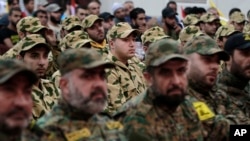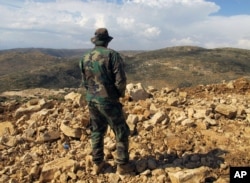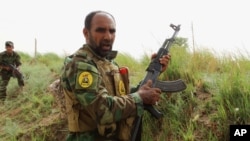When Hezbollah first intervened on the side of President Bashar al-Assad in Syria, Israeli defense analysts saw the foray as a blessing — better to have their Lebanese arch-enemy entangled in a war in Syria. But there is increasing concern that Hezbollah is getting valuable battlefield experience in Syria, especially when it comes to large-scale, coordinated offensive operations, something the Shi’ite militia had little knowledge of before.
That practical experience could be of use in any subsequent conflict with Israel. Hezbollah commanders acknowledge the benefits.
“In some ways, Syria is a dress rehearsal for our next war with Israel,” a special forces Hezbollah commander admitted to VOA recently.
Peacetime training is no substitute for wartime experience, says John Capello, a former U.S. air attaché in Tel Aviv and now an analyst with the Foundation for the Defense of Democracies, a Washington foreign policy think tank.
“NATO makes a big effort to make training as realistic as possible but it is still scripted and doesn’t teach how to deal with the unexpected. It just isn’t the same as the real thing.”
Hezbollah has been in the vanguard of large assaults on Syrian rebels and not just along the border in Qalamoun and Quneitra but also further afield around Aleppo in northern Syria.
Anti-Assad rebel commanders estimate that 80 percent of the ground forces the Assad regime has deployed since the Russian bombing campaign was launched in September 2015 have not consisted of Syrians but are made up of Hezbollah and Iranian fighters along with Shi’ite volunteers from Iraq, Afghanistan and Pakistan.
New proficiencies
“Hezbollah has become more proficient at mass force maneuvers and of tying together different battle groups — and leveraging all of that with the lessons it learned from the war with Israel in 2006, especially when it comes to defeating armor,” says Aram Nerguizian, a Mideast analyst with the Center for Strategic and International Studies. The Iranian revolutionary guardsmen and Hezbollah militiamen have been fighting side-by-side for months now, honing their ability to work together.
The military tie-up predates the Syrian war, says Nerguizian.
“It has always been the case that you have had a fair amount of synergy between the Iranians and Hezbollah in terms of tactics, command-and-control and training. ...the missions they are involved with in Syria are different from what they have been working on with Iranian revolutionary guards in the context of strategic competition with the Israelis. So in Syria, Hezbollah has had to become somewhat masterful in counter-insurgency. So you have an insurgent group that has become one of the most capable actors on the ground when it comes to a counter-insurgency role,” he adds.
Hezbollah has also learned to coordinate with other other irregular militias that have come from as far away as Afghanistan. And Israel’s arch-enemy has become used to working with the Russian military — calling in airstrikes and liaising when it comes to intelligence and reconnaissance.
“Hezbollah is learning to use more sophisticated equipment, and it is getting more battlefield experience for its fighters,” says Matthew Levitt, director of the Stein Program on Counterterrorism and Intelligence at the Washington Institute for Near East Policy, a think tank. Up to 10,000 Hezbollah militiamen are estimated to have been fighting in Syria at any one time.
“Yes, it has taken greater losses in this conflict than it has in all the wars against Israel. Some of those have been pretty important people,” says Levitt, author of the book “Hezbollah: The Global Footprint of Lebanon's Party of God.” “But overall it is seeing higher recruitment levels and more people being drawn to the cause,” he adds.
It wasn’t always that way.
Doubts about Syrian involvement
Hezbollah lent support to Assad’s regime from the start of the civil war with small numbers of fighters but committed heavily when the war dragged on to do all it could militarily to save Syria’s strongman, a member of the Alawite minority sect, an offshoot of Shia Islam.
Hezbollah fighters have been schooled from a young age to submit to strict military discipline and are nurtured in a culture of martyrdom, believing that God sanctions their struggles.
Many have attended university or at least completed high school, and their military and ideological training is rigorous. They are lauded within the Shi’ite communities of the Bekaa Valley and southern Lebanon as defenders of a Muslim sect that traditionally was powerless and downtrodden in a country dominated by Christian and Sunni Muslim landlords and politicians.
Hezbollah changed all of that, shifting the pecking order when it comes to political power in Lebanon.
Even so, many Lebanese Shi’ites doubted the wisdom of the involvement in Syria. When young Lebanese Shi’ite fighters started to return in body bags in 2014, some supporters, especially those in southern Lebanon, questioned why Hezbollah was fighting in Syria, arguing the real enemy is Israel. But a series of jihadist bombings in Shi’ite strongholds of Beirut and suicide bombings in the Bekaa Valley changed that — the critics fell back into line.
“The Islamic State has been a saving grace for Hezbollah’s recruitment efforts,” says Levitt. Until the bombings and the rise of the Islamic State, “there was a lot of backlash to Hezbollah,” he adds. “Hezbollah is seen as the only one capable of defending Shi’ites from the onslaught of the radical Sunnis.”
Future conflict
Other enhanced Hezbollah capabilities, say analysts, include using artillery cover more effectively, using drones skillfully in reconnaissance and surveillance operations and improving logistical operations to support big offensives. Analysts, as well as Israeli strategists, are now trying to work out the possible longer-term implications of Hezbollah’s increased military capabilities — as well as the deepening of its military alliance with Iran.
“Hezbollah doesn’t want a war with Israel right now,” says Levitt. “It is not capable of fighting a fully-fledged conventional conflict on multiple fronts. But Hezbollah has to be able to demonstrate that it remains a resistance [to Israel] organization, and they recognize it is not enough to say that the road to Jerusalem runs through Damascus, because apart from anything, that is poor geography. It is important for them to be able to open up a front from which they can do smaller things from time to time against Israel and to scratch that resistance itch.”
Levitt argues Hezbollah doesn’t want to do that from Lebanon, taking seriously the Israeli threat to launch a massive retaliatory strategic air campaign on the country’s infrastructure. That points to the Golan Heights, a region captured from Syria and occupied by Israel during the Six-Day War, territory which Israel effectively annexed in 1981.
Nerguizian also sees the Golan as the flashpoint, one that is better terrain for Hezbollah, if it wants to use its new capabilities. The territory around the Blue Line, the border demarcation between Lebanon and Israel established by the UN, is more constraining for larger offensive operations. “They would like to maintain a stable footing in the Golan and leave troops there after the Syrian civil war is over,” says Nerguizian.
And there has been considerable activity by Hezbollah and Iranian guards in Syria’s Golan region, prompting a series of Israeli airstrikes since the start of last year. Israeli officials calculate much of that activity by their diehard foes has little to do with the current conflict in Syria but everything to do with planning for a future conflict with Israel. In January 2015, an Israeli airstrike in Syria’s Golan targeting a two-car convoy killed six Hezbollah fighters, including two prominent commanders, and an Iranian general, Mohammad Ali Allahdadi.
There have been others, as Israeli Prime Minister Benjamin Netanyahu acknowledged on April 12, when he said Israel has carried out “dozens” of air raids in Syria to prevent weapon and missile transfers to Lebanon's Hezbollah.
He chose to make his remarks while visiting a training exercise of reserve military soldiers in the Israeli-occupied Golan Heights. An Israeli official told VOA, Israel will not allow Hezbollah and the Iran revolutionary guards to set up bases in Syria’s Quneitra province along the Golan Heights.








